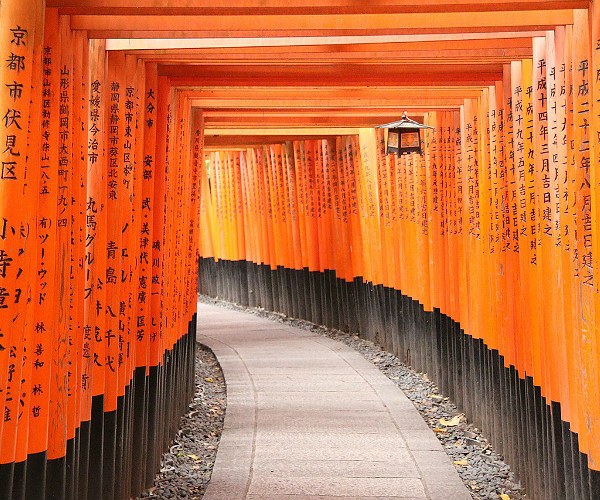Do I need a visa to visit Japan?
Whether it’s the modern skyscrapers of Tokyo or the old geisha traditions of Kyoto that draw you, or something else altogether, Japan is sure to offer you one of the richest and most rewarding travel experiences. The country is enjoying the global spotlight currently, what with the Rugby World Cup and the Tokyo Olympics, but there are many cultural highlights to also enjoy. If you’re inspired to visit this fascinating nation for yourself, then the first thing you’ll need to know is whether you need a visa. Courtesy of a collaboration with Visas Japan, this post is designed to tell you in the ins and outs of Japan’s visa requirements.
 Who needs a visa?
Whether you need a visa to visit Japan depends on your nationality. At the time of writing, there are 68 countries that do not require visas for stays of up to 90 days if visiting for tourism, commerce, conferences, visiting family or friends, etc.
The 68 countries that are visa exempt are as follows: All European Union citizens, Australia, Argentina, Bahamas, Barbados, Brunei, Canada, Chile, Costa Rica, Dominican Republic, El Salvador, Guatemala, Honduras, Hong Kong, Iceland, Israel, Lesotho, Liechtenstein, Macau, Macedonia, Malaysia, Mauritius, Mexico, Monaco, New Zealand, Norway, San Marino, Serbia, Singapore, South Korea, Suriname, Switzerland, Taiwan, Thailand, Tunisia, Turkey, United States and Uruguay.
If you are a national of a country that is not listed above, you will need a visa to visit Japan.
Who needs a visa?
Whether you need a visa to visit Japan depends on your nationality. At the time of writing, there are 68 countries that do not require visas for stays of up to 90 days if visiting for tourism, commerce, conferences, visiting family or friends, etc.
The 68 countries that are visa exempt are as follows: All European Union citizens, Australia, Argentina, Bahamas, Barbados, Brunei, Canada, Chile, Costa Rica, Dominican Republic, El Salvador, Guatemala, Honduras, Hong Kong, Iceland, Israel, Lesotho, Liechtenstein, Macau, Macedonia, Malaysia, Mauritius, Mexico, Monaco, New Zealand, Norway, San Marino, Serbia, Singapore, South Korea, Suriname, Switzerland, Taiwan, Thailand, Tunisia, Turkey, United States and Uruguay.
If you are a national of a country that is not listed above, you will need a visa to visit Japan.
 What are the visa entry requirements?
In order to obtain a visa, you must have a valid passport with at least 6 months validity and 2 blank pages. You will also need to submit a completed and signed visa application form, along with a recent colour photograph that is 4.5 x 4.5 cm and with a white background. An official birth certificate or a certified copy is also required and, if the traveller is married, he or she will need to submit a marriage certificate issued within the past year. The visitor will also need to provide a schedule and travel plans for his or her time in Japan.
What are the visa entry requirements?
In order to obtain a visa, you must have a valid passport with at least 6 months validity and 2 blank pages. You will also need to submit a completed and signed visa application form, along with a recent colour photograph that is 4.5 x 4.5 cm and with a white background. An official birth certificate or a certified copy is also required and, if the traveller is married, he or she will need to submit a marriage certificate issued within the past year. The visitor will also need to provide a schedule and travel plans for his or her time in Japan.
 What kind of visa can I apply for?
There are multiple different kinds of visa that can be applied for when visiting Japan. For short term stays, travellers can choose from a tourist visa, a business visa or a transit visa. Please note that by April 2020, the government of Japan is planning to introduce an electronic visa system to simplify the process of obtaining a visa to visit the country.
For longer stays, visitors have working visas, highly skilled professional visas, general visas, specified visas, diplomatic visas and official visas to choose from.
What kind of visa can I apply for?
There are multiple different kinds of visa that can be applied for when visiting Japan. For short term stays, travellers can choose from a tourist visa, a business visa or a transit visa. Please note that by April 2020, the government of Japan is planning to introduce an electronic visa system to simplify the process of obtaining a visa to visit the country.
For longer stays, visitors have working visas, highly skilled professional visas, general visas, specified visas, diplomatic visas and official visas to choose from.
 When it comes into effect, the Visa Online System will be the preferred application method. It will only take a few minutes to complete and will negate the need to visit an embassy or consulate in order to obtain a visa. It will also come into effect in time for the 2020 Tokyo Olympics in an effort to boost foreign visitor numbers which are expected to reach 60 million by the year 2030.
When it comes into effect, the Visa Online System will be the preferred application method. It will only take a few minutes to complete and will negate the need to visit an embassy or consulate in order to obtain a visa. It will also come into effect in time for the 2020 Tokyo Olympics in an effort to boost foreign visitor numbers which are expected to reach 60 million by the year 2030.
 Disclosure: This post is sponsored by Visas Japan.
Disclosure: This post is sponsored by Visas Japan.
 Who needs a visa?
Whether you need a visa to visit Japan depends on your nationality. At the time of writing, there are 68 countries that do not require visas for stays of up to 90 days if visiting for tourism, commerce, conferences, visiting family or friends, etc.
The 68 countries that are visa exempt are as follows: All European Union citizens, Australia, Argentina, Bahamas, Barbados, Brunei, Canada, Chile, Costa Rica, Dominican Republic, El Salvador, Guatemala, Honduras, Hong Kong, Iceland, Israel, Lesotho, Liechtenstein, Macau, Macedonia, Malaysia, Mauritius, Mexico, Monaco, New Zealand, Norway, San Marino, Serbia, Singapore, South Korea, Suriname, Switzerland, Taiwan, Thailand, Tunisia, Turkey, United States and Uruguay.
If you are a national of a country that is not listed above, you will need a visa to visit Japan.
Who needs a visa?
Whether you need a visa to visit Japan depends on your nationality. At the time of writing, there are 68 countries that do not require visas for stays of up to 90 days if visiting for tourism, commerce, conferences, visiting family or friends, etc.
The 68 countries that are visa exempt are as follows: All European Union citizens, Australia, Argentina, Bahamas, Barbados, Brunei, Canada, Chile, Costa Rica, Dominican Republic, El Salvador, Guatemala, Honduras, Hong Kong, Iceland, Israel, Lesotho, Liechtenstein, Macau, Macedonia, Malaysia, Mauritius, Mexico, Monaco, New Zealand, Norway, San Marino, Serbia, Singapore, South Korea, Suriname, Switzerland, Taiwan, Thailand, Tunisia, Turkey, United States and Uruguay.
If you are a national of a country that is not listed above, you will need a visa to visit Japan.
 What are the visa entry requirements?
In order to obtain a visa, you must have a valid passport with at least 6 months validity and 2 blank pages. You will also need to submit a completed and signed visa application form, along with a recent colour photograph that is 4.5 x 4.5 cm and with a white background. An official birth certificate or a certified copy is also required and, if the traveller is married, he or she will need to submit a marriage certificate issued within the past year. The visitor will also need to provide a schedule and travel plans for his or her time in Japan.
What are the visa entry requirements?
In order to obtain a visa, you must have a valid passport with at least 6 months validity and 2 blank pages. You will also need to submit a completed and signed visa application form, along with a recent colour photograph that is 4.5 x 4.5 cm and with a white background. An official birth certificate or a certified copy is also required and, if the traveller is married, he or she will need to submit a marriage certificate issued within the past year. The visitor will also need to provide a schedule and travel plans for his or her time in Japan.
 What kind of visa can I apply for?
There are multiple different kinds of visa that can be applied for when visiting Japan. For short term stays, travellers can choose from a tourist visa, a business visa or a transit visa. Please note that by April 2020, the government of Japan is planning to introduce an electronic visa system to simplify the process of obtaining a visa to visit the country.
For longer stays, visitors have working visas, highly skilled professional visas, general visas, specified visas, diplomatic visas and official visas to choose from.
What kind of visa can I apply for?
There are multiple different kinds of visa that can be applied for when visiting Japan. For short term stays, travellers can choose from a tourist visa, a business visa or a transit visa. Please note that by April 2020, the government of Japan is planning to introduce an electronic visa system to simplify the process of obtaining a visa to visit the country.
For longer stays, visitors have working visas, highly skilled professional visas, general visas, specified visas, diplomatic visas and official visas to choose from.
 When it comes into effect, the Visa Online System will be the preferred application method. It will only take a few minutes to complete and will negate the need to visit an embassy or consulate in order to obtain a visa. It will also come into effect in time for the 2020 Tokyo Olympics in an effort to boost foreign visitor numbers which are expected to reach 60 million by the year 2030.
When it comes into effect, the Visa Online System will be the preferred application method. It will only take a few minutes to complete and will negate the need to visit an embassy or consulate in order to obtain a visa. It will also come into effect in time for the 2020 Tokyo Olympics in an effort to boost foreign visitor numbers which are expected to reach 60 million by the year 2030.
 Disclosure: This post is sponsored by Visas Japan.
Disclosure: This post is sponsored by Visas Japan.Did you enjoy this article?
Receive similar content direct to your inbox.


“All European citizens”. Is that citizens within the European Community? If, say hypothetically, a European country isn’t in the EU will they require a visa?
I’ll leave it there. Don’t want to get too political at this early time on a Friday morning!
That’s the way I took it, Roger. European Union rather than a European country. So perhaps come the end of January 2020 we’ll all be needing visas. You’re right, too early to be getting into political nonsense, it’s all too frustrating!
If you check, what it actually says is “All European Union citizens” not just “All European citizens”.
The exemption list is then followed by some European countries that are not EU members, such as Norway and Switzerland.
Hope this is clear,
Paul
I think people are more aware and cautious of travelling now since Brexit because of changes to passports and uncertainty over visa requirements both in and outside of EU countries. Really good point about needing 6 or more months left on it too. There are other countries with that requirement, but I hadn’t known about getting a marriage cert for the visa if you’re married. Or needing to show the schedule of what you’re going to do when you get there.
So although we’re in the European Union at the moment and don’t need a visa for shorter stays, once we leave I guess we would. Just as well the electronic system is coming into place soon as there will probably be a lot more visa requests coming through!
Very timely advice. Leaving aside a little event called the Olympics, Japan is trending. A lot of people are planning to drop in this year.
Two of my friends travelled to Japan for the Rugby World Cup and they were totally overwhelmed by the hospitality of their welcome from the Japanese people. If they are as good at looking after people at the Olympics it will boost Japanese tourism for the next few years. A lot of people will be applying for those visas.
Japan is a beautiful country and japan people most gentle than other countries people. They also more discipline. So people have a huge attraction to Japan. This is good news for japan loving person. I also love Japan and his country, people. Visa is the way to meet theirs.
I’m actually visiting Japan this June and have been preparing a list of the documents I would need for my visa application. Unfortunately, my passport requires me to apply for one. And it is confirmed with this list that you have. I have also confirmed with the official Japan Ministry of Foreign Affairs website.
Hong Kong, Taiwan, Macao is a part of China. Please, writer don’t separate them, they are consequentially not independent countries.
True, they are not officially independent countries. However, they are special administrative regions for which there are special conditions. Those three are visa exempt when it comes to requiring a visa to visit Japan, whilst my understanding is that China for the most part is not. I hope this helps clarify the need for a distinction.